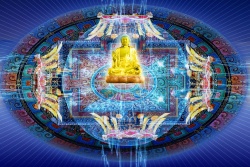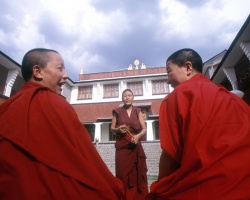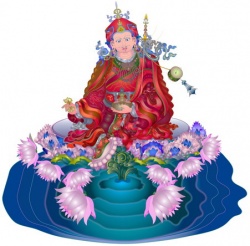Fazang on śrāvaka precepts
Fazang on śrāvaka precepts
By Indrajala (Jeffrey Kotyk)
The following is a brief excerpt from Fazang's commentary on the Brahma Net Sutra's Bodhisattva vows 梵網經菩薩戒本疏 (T1813).
- 第二諸藏所攝者。
- II. Contents of the Stores
- 此有四重。
- This has four layers.
- 初約二藏有二。
- 1. Concerning the two stores having two [layers].
- 謂大小二乘各有菩薩藏聲聞藏。於此四中唯大乘內菩薩藏攝。
- These are said to be the Mahayana, the Hinayana and the two vehicles each having the Bodhisattva store and the śrāvaka store. Within these four it is only within the Mahayana that the Bodhisattva store is [completely] contained.
- 或通大乘聲聞藏攝。
- 以大中聲聞悉許成佛。於此戒法亦受持故。
- Because within the Mahayana the śrāvaka are all able to become Buddhas, these (śrāvaka) vows are also maintained.
- 亦通收小中菩薩。以彼三十四心成佛等事、離此實戒更無餘故。
- [The Mahayana) also passes through and absorbes the Bodhisattva [stages] contained within the lesser (vehicle). This is because outside the actual vows of those thirty-four [states of] mind, achieving Buddhahood, and such things, there are furthermore no other [practises].
- 或亦通彼聲聞藏。以七眾所持、別解脫戒、皆是菩薩律儀攝故。是故彼法亦在此中。
- Some also pass through the śrāvaka store. This is because of the different liberation vows which the seven assemblies all maintain are all subsumed within the Bodhisattva disciplinary regulations. Thus those (śrāvaka) teachings are also within this one.
There are two interesting things I'd like to point out.
The first is that the statement "...within the Mahāyāna the śrāvaka are all able to become Buddhas..." is an idea drawn from the Lotus Sutra where Hīnayāna practitioners are also said to eventually achieve Buddhahood. This was something that Mahāyāna thinkers differed on amongst themselves. Some thought that Hīnayāna practitioners would achieve Arhatship and enter Parinirvāṇa never to return. Others proposed that Arhatship was only temporary, albeit a fairly long, stage and that eventually all beings without exception including Arhats would achieve final unexcelled Buddhahood. It is evident that Fazang was in favour of the later theory.
The second relevant point here is that Fazang is in full support of a Mahāyāna Bodhisattva aspirant observing the śrāvaka precepts. At first that sounds like common sense, but we should keep in mind that only a few decades prior there was Daoxuan, a noted scholar and advocate of the Vinaya, who complained of Mahāyāna practitioners disregarding the Hīnayāna precepts.
- 《四分律刪繁補闕行事鈔》卷2:「今時不知教者。多自毀傷云。此戒律所禁止。是聲聞之法。於我大乘棄同糞土。猶如黃葉木牛木馬誑止小兒。此之戒法亦復如是。誑汝聲聞子也。」(CBETA, T40, no. 1804, p. 49, b27-c1)
- In present times many of those who do not know the teachings destroy and injure themselves saying,"These Vinaya prohibitions are a śrāvaka teaching. In our Mahāyāna we toss it away just like dirty soil. Just like yellow leaves, a wooden cow or a wooden horse deceive a little child, these precept teachings are like this. They deceive you little śrāvaka!"
One can gather from Daoxuan's writings that in his day, which was only a generation or two before Fazang, that some Buddhist monks in China did not actually observe the Vinaya. It should be noted that during the Tang dynasty there were many "monks" who bought their ordination certificates and engaged in questionable and immoral activities and businesses. There was something of a mirror monastic community that was really just a refuge for those wanting to avoid mandatory civil labour duties and taxation. It was something of an ongoing problem throughout the Tang dynasty and it resulted in more and more regulations and restrictions being placed on monastics eventually resulting in the great repression of 845.
I would venture to say that Fazang was aware of this problem and thus in his commentary on Mahāyāna precepts he also indicated that Mahāyāna vows also by default include the Hīnayāna precepts as well so a monk is obligated to conduct himself in line with the Vinaya.


